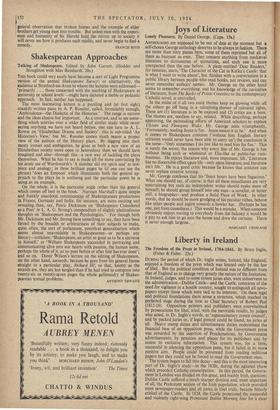Joys of Literature
Lonely Pleasures. By Daniel George. (Cape. 15s.) ANTHOLOGIES are supposed to be out of date at the moment but a self-chosen George anthology deserves to be always in fashion. There are more than sixty pieces here, some of them reprinted but all of them as buoyant as ever. They concern anything from medieval literature to dictionaries of quotations, and each one is more unexpected than the one before. A piece entitled 'Dear Readers,' for instance, starts,' The Character of the Cat in Kafka's Castle: that is what I want to write about', but finishes with a conversation in a public library between people who read books, not reviews, and can never remember authors' names. Mr. George on the other hand seems to remember everything, and his knowledge of the curiosities of literature, from The Booke of Prittie Conceites to the contemporary Catholic novel, is unrivalled.
In the midst of it all two main themes keep on glowing while all the others go off bang in a tantalising shower of coloured lights. These are (I) literature is to be enjoyed and (2) critics are a bore. The themes are, needless to say, related. While describing, perhaps approving, the painstaking efforts of American scholars to explain Ulysses and Finnegans Wake, Mr. George adds triumphantly, 'Fortunately, reading Joyce is fun. Joyce meant it to be.' And when it comes to Shakespeare criticism (' without him English literary criticism would never have been able to carry on').the conclusion is the same—' Only sometimes 1 do just like to read him for fun.' This is surely the secret, the reason why every line of Mr. George is fun without being arch or whimsical or Elia-like or public-bar rum- bustious. He enjoys literature and, more important, life. 'Literature has no discernible effect upon life—only upon literature, and literature isn't life.' He is a good critic because he knows that criticism can never replace creative writing.
Mr. George confesses that his 'finest hours have been fugacious' What one should say, of course, is that all these miscellanies are very entertaining but such an independent writer should make more of himselfi he should group himself into one man—a novelist, or better still, a biographer—and produce a Solid Piece of Work. In other words, that he should be more grudging of his peculiar riches, behave like other people and aspire towards a bowler hat. (Perhaps he has one, just from cussedness.) This would be a mistake. When someone obviously enjoys waving to everybody from the balcony it would be a pity to ask him to go into the house and draw the curtains. There is never enough largesse.
MARGARET CROSLAND


































 Previous page
Previous page